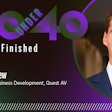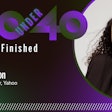Time-strapped meeting pros asking “How can I accomplish more?” are better served reframing the question to “What can I do to feel more accomplished?” according to Andy Core, motivational speaker and author of “Change Your Day, Not Your Life.”
Core shared with Connect five tips for creating balance, managing work-related stress and staying motivated, even when things go awry.
1. Focus on what’s in your control.
“One of the primary causes of stress, worry and anxiousness in meeting pros is the tendency to get too focused on things they don’t have control over,” says Core.
Clearly communicating expectations to vendors like hotels, catering personnel and equipment suppliers—and then holding them accountable for delivery of services—is how seasoned pros avoid the trap of what Core calls hyper-responsibility. “Don’t say it’s your fault if it’s not your fault,” he says.
2. Focus on the process.
“Stress and pressure go up when planners focus solely on outcomes,” says Core. “A singular focus on a successful event can sabotage all the steps along the way that lead to success. Be aware of the process and what will get you to your endpoint.”
Core notes that Olympic and professional athletes focus on all the intermediary steps, skill development and execution of their plans as crucial steps in achieving their goal.
“Once the execution mindset is ingrained,” says Core, “amazing things happen.” Core notes a bonus is planners enjoy their work more because they know it leads to results. “It’s motivation nirvana,” he says.
3. Use the two-hour rule.
Planners juggle so many balls it’s inevitable for occasional mistakes to happen, deadlines to slip or an assignment to be missed. According to Core, self-compassion, forgiveness and the ability to quickly move forward using the two-hour rule can flip frustration to motivation.
“If you mess up and make a mistake, miss a deadline or even procrastinate on something you know you should have taken care of,” Core says, “go ahead and complain, cry and beat yourself up, but after two hours, move on.”
Core says holding firm with self-forgiveness after two hours defeats what psychologists refer to as the limit violation effect, a situation where you’ve given yourself a deadline or goal, violated that and then felt bad about it.
4. Pay attention to emotional connections.
Core says connecting with friends, family and others by leaving work at work is critical in regaining the energy to be more productive at work. Try a digital detox and turn off your phone when you leave the office. Most everything can wait.
5. Acknowledge the big picture.
Core often hears planners say their job is “consuming” them. He suggests a shift in perspective. He agrees with Zappos CEO Tony Hsieh who said, “At the end of the day it shouldn’t be about work versus life—it should just be about life.”
Core says well-defined values and core beliefs; a desire for excellence; the ability to choose tasks, responsibilities, memberships and associations that complement each other; and the ability to delegate are critical components to an integrated life.
“Life balance and better health are the foundations of improving every aspect of your life, your career, your relationships and the ability to connect,” says Core. “Everyone deserves a great life.”
For more information, visit
andycore.com.















